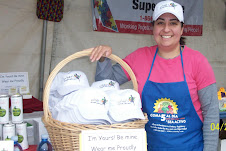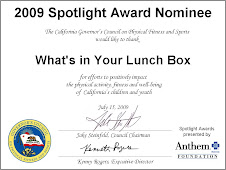We're sharing Jesse's recipe from our Nutrition and Cooking program on April 9, 2010.
These delicious gluten-free Sweet Potato Muffins helped to demonstrate how a family's "Sunday Dinner", can jump-start 'nutritious' meals using leftovers. With smart and deliberate shopping, purposeful meal planning and the desire to reprioritize nutrition, you really can get more 'cluck from your buck' and have quality time at home with your family. From Sunday's leftovers we made meals for Monday, Tuesday, with these scrumptious muffins for breakfast or the Lunch Box on Wednesday. Their nutritional value is boosted by the sweet potatos, Picabi's Sparking Apple juice (loaded with vitamins), flaxseed and cinnamon. You will love them.
Sweet Potato Muffins (Gluten Free)Recipe courtesy of Jesse D. Smith,
What’s In Your Lunch Box?, Inc.
Ingredients • 2 cups “gluten-free” flour (note: some of these flours require adding xanthan gum.)
• 2 teaspoons baking powder
• 1 teaspoon salt
• 1 tablespoon flaxseed meal (optional)
• 3/4 cup brown sugar
• 2 large eggs
• 1/2 cup oil (vegetable, canola or light olive oil)
• 3/4 cup Picabi 100% Sparkling Apple Juice
• 3/4 cup sweet potato (1/2 cup boiled/baked to soft consistency + 1/4 cup raw shredded or grated)
• 1 teaspoon cinnamon
• 1 teaspoon pure vanilla extract or ¼ teaspoon of vanilla powder
Directions Preheat oven to 350° Fahrenheit. Wrap one (1) medium-sized sweet potato in foil, place directly on rack in oven and cook for 45-55 minutes or cover with water in pot and boil on stove top until soft throughout. Line muffin pan(s) cups with paper liners; set aside.
Combine flour, xanthan gum if needed, baking powder, salt and flaxseed meal in a large bowl. In a separate, medium-sized bowl mix the brown sugar and eggs. Then add the oil, Picabi apple juice, vanilla and cinnamon blending until combined. Add the brown sugar mix to the large bowl and mix just until the dry ingredients are moistened. Stir in the prepared and shredded sweet potato.
Spoon batter into baking cups filling about 2/3 full (an ice cream scoop works too). Bake at 350° for 20 – 30 minutes or until the tops spring back when touched. Yields approximately 18 muffins.
Remove muffins from pan immediately and cool on a wire rack. Store muffins in an airtight container or large Ziploc bag to preserve freshness. Muffins may also be frozen and warmed when ready to eat.
*Cook's Note: Add a sprinkle of Turbinado sugar to muffin tops before baking for a crunchy texture and hint of sweetness.









